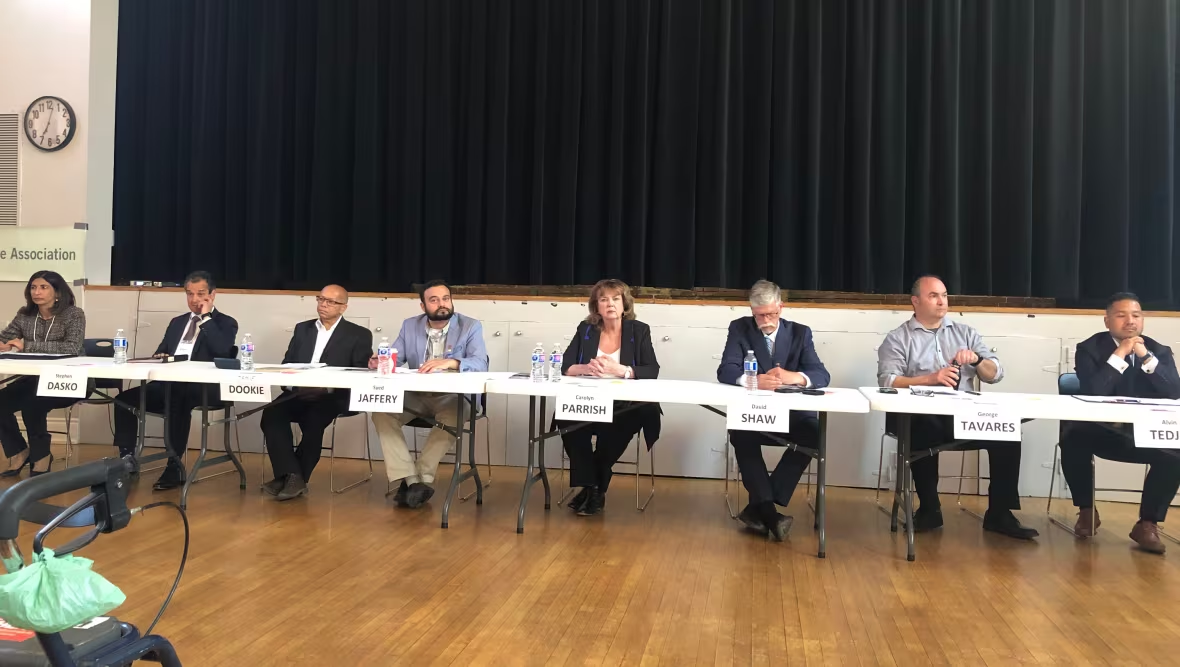Mississauga's next mayor to have more planning power
Candidates welcome planning power, divided on if they'd use strong mayor powers

The race to become the next mayor of Mississauga is now well underway, and whoever lands the job will lead the city with greater planning powers than the previous mayor possessed.
The provincial government is downloading planning responsibility from the Region of Peel to the City of Mississauga as of July 1, something intended to get housing built faster. The change comes two years after it granted strong mayor powers in 2022, providing the mayor with a veto, also intended to accelerate housing projects.
The planning shift does change the election for Mississaugans, says York University political scientist Zachary Spicer.
That's because whoever the city elects will have both strong mayor powers and lead a city that has full responsibility over planning, giving the new mayor more authority than any other mayor of Mississauga has had over one of the most contentious responsibilities.
For the first time, zoning decisions will all fall to the city, which affect key choices that could change neighbourhoods and affect how the city grows, by allowing for things like mixed-use residential in areas that were previously only commercial.
Two-tier municipalities, like Mississauga in Peel Region, often have projects that must be approved by two different councils. Single-tier municipalities, like nearby Toronto, do not face such a planning process.
The shift in responsibilities over planning mean proposed housing developments will no longer need to conform to two different official plans and will no longer risk receiving support from Mississauga, but being rejected by the Region of Peel.
"It adds to the stakes of the election," Spicer said.
"It definitely is a change and could lead to significant policy outcomes."
Spicer says voters who want more housing built should be asking candidates who claim to want to build more housing: "How badly do you want to build something? And are you willing to use strong mayor powers?"

While many running for mayor of Mississauga say giving the city the planning responsibilities is a positive move, the candidates are divided about whether they'd use strong mayors powers.
While some voters view strong mayor powers as undemocratic, some may view a willingness to use them positively, says York University political scientist Dennis Pilon.
"Someone coming in and saying, 'I'm going to get stuff done, and I'm going to take action,' that is appealing," he said.
For others, he says, fewer voices in the the decision-making mix could leave them feeling community concerns aren't being heard, which can be a turn-off.
Former mayor Bonnie Crombie did use the powers a few times, including to ensure Mississauga could move forward with allowing fourplexes across the city.
Here's what a few of the candidates vying to replace her told CBC Toronto they'd do:
Alvin Tedjo
Alvin Tedjo says he'd prefer to find consensus over using strong mayors powers, but he didn't rule them out.
"If it's necessary for us to build more housing because of how important building more housing is and helping people with affordability, then yeah, I'll use it when necessary," he said.
Tedjo said he might also use the powers to push through his budget, which includes tax freezes and tax cuts for low-income seniors and small businesses.
Carolyn Parrish
Carolyn Parrish also said she'd prefer to persuade council members to support her policies, but noted council has sometimes "hit brick walls" when it comes to housing.
She already has projects she is thinking of using strong mayor powers to push through, such as to make sure the redevelopment of Heartland Town Centre includes a significant residential portion. One plan to do so was already voted down by Mississauga council.
Stephen Dasko
Stephen Dasko says collaboration and reaching a consensus is his preference, but he would use strong mayor power for things, such as ensuring housing for seniors gets built, if council is at an impasse.
"If we've exhausted all of those and and we do need to move on ... that's where strong mayor powers can be used," he said.

Brian Crombie
"The strong mayor powers should be thought of similar to the notwithstanding clause, an unusual power that should only ever be used in extraordinary circumstances," said Brian Crombie in a statement.
However, he said he'd use the powers when necessary to ensure housing is built.

George Tavares
George Tavares told CBC Toronto he wouldn't use strong mayor powers.
"If you can't get the majority of 12 people to vote on a project regarding housing, then you have bigger problems with communication in city council," he said.
Dipika Damerla
"I don't expect I will need to use them," Dipika Damerla told CBC Toronto, about strong mayor powers.
"I think there's a way to lead that's inclusive and you bring people along and that's my style," she said, calling the planning download "a big plus."

Voters head to the polls on June 10.
Here's the full list of candidates:
- Zulfiqar Ali
- Diya Atassi
- Brian Crombie
- Dipika Damerla
- Stephen Dasko
- Jamie Dookie
- Frank Fang
- Xiaohua Gong
- Winston Harding
- Sara Iqbal
- Syed Jaffery
- Mohsin Khan
- Mitchell MacEachern
- Sinisa Mandrapa
- Mike Matulewicz
- Carolyn Parrish
- David Shaw
- George Tavares
- Alvin Tedjo
- Nathalie Xian Yi Yan